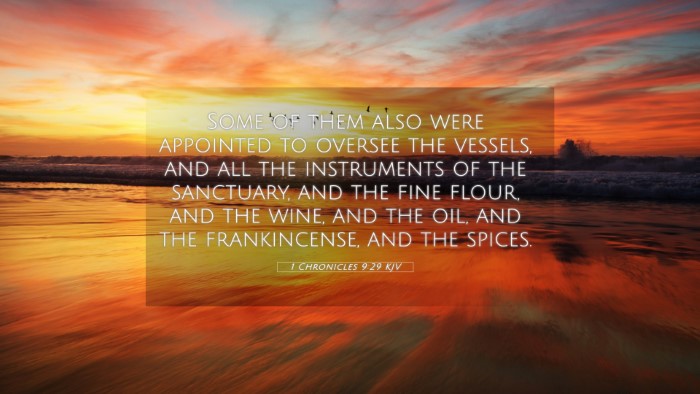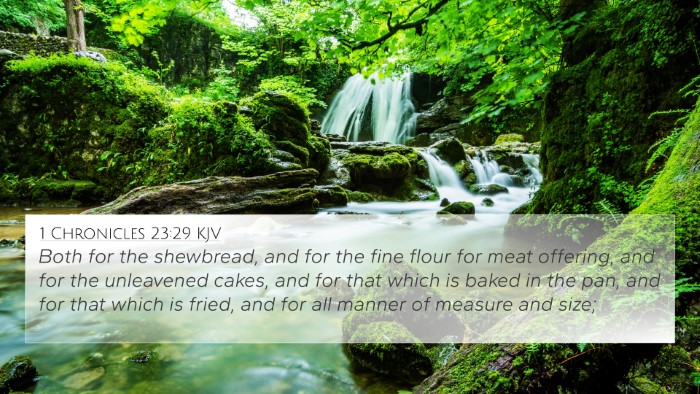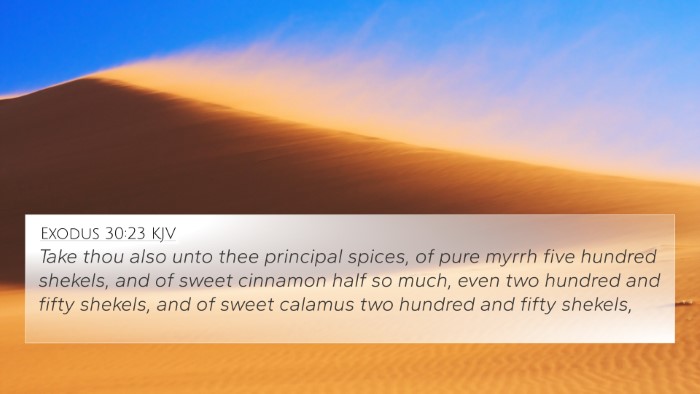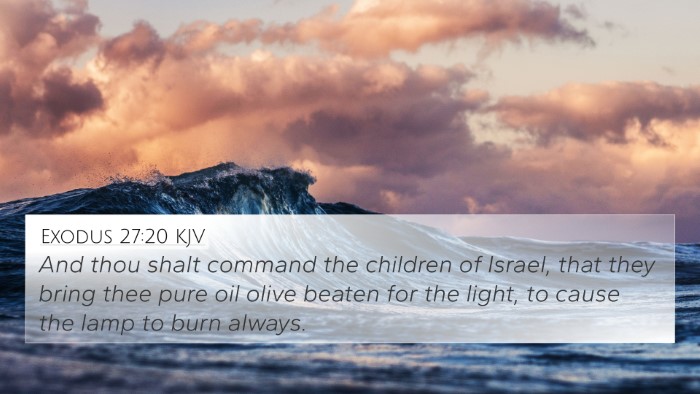Understanding 1 Chronicles 9:29
1 Chronicles 9:29 states: "Some of them were in charge of the articles used in the temple service, and they were responsible for the fine flour, the wine, the oil, the incense, and the spices."
This verse emphasizes the roles and responsibilities assigned to certain individuals in the temple, focusing on the importance of their duties in the worship environment.
In a broader sense, it reflects on the structure and organization within the temple, underscoring the seriousness and sanctity of the rituals involved.
Commentary Insights
Matthew Henry's Commentary
Matthew Henry notes that this verse highlights the management of sacred items, indicating the need for diligence and accountability among those who are entrusted with spiritual responsibilities.
It serves as a reminder that all duties in service to God are worthy of honor, and the preparation of offerings is essential to worship.
The verse subtly connects these responsibilities to the broader theme of worship and the sacredness of approach before God.
Albert Barnes' Commentary
Albert Barnes emphasizes the idea that the temple service was a well-ordered system, and each individual had a significant role to play.
The verse reflects the Jewish understanding of sacrifice, which is not merely a ritual but involves dedicated service and stewardship.
It ties into the larger biblical narrative on the importance of purity and the right attitude in bringing forth offerings to God.
Adam Clarke's Commentary
Adam Clarke points out that the mention of specific offerings like fine flour and wine reflects Jewish traditions surrounding sacrifices and offerings, connecting it to various practices mentioned throughout the Torah.
Each item mentioned can be symbolically linked to different aspects of devotion and service, portraying a holistic view of worship.
Cross-References to 1 Chronicles 9:29
- Exodus 29:40-41: Discusses the offerings that were to be made to God, similar to those listed in 1 Chronicles 9:29.
- Leviticus 2:1: Provides details about offering fine flour, showing the continuity of practices within the temple.
- Numbers 15:4-5: Outlines drink offerings, thereby establishing a link with the sacrificial system.
- Psalm 141:2: Invokes the imagery of offerings, relating to worship and prayer.
- Hebrews 9:9: References the earthly sanctuary, bridging Old Testament practices with New Testament understanding.
- 1 Peter 2:5: Calls believers a royal priesthood, affirming the role of offering spiritual sacrifices.
- Malachi 1:11: Highlights the importance of pure offerings, drawing attention to temple responsibilities.
Thematic Connections and Analysis
The roles described in 1 Chronicles 9:29 are part of a larger narrative that details the meticulous organization of worship in ancient Israel.
It indicates that worship requires a community effort and that everyone has a significant part to play.
Connecting further, we see the New Testament reflective of these themes wherein believers are called to be aware of their contributions to the body of Christ (1 Corinthians 12:12-27).
The discussions of offerings and responsibilities lead not just to an understanding of duty but to deeper spiritual reflections on our own roles in corporate worship.
Practical Applications
Reflecting on 1 Chronicles 9:29 encourages modern believers to consider their service in the community of faith.
Just as the temple officials were entrusted with specific duties, today’s church members are called to fulfill roles that advance the worship and service of God.
This verse underscores the importance of preparation, stewardship, and reverence in church services, inviting believers to take their participation seriously.
It serves as a challenge to examine what quality of service is being offered in contemporary contexts.
Conclusion
1 Chronicles 9:29 may appear at first glance to be a simple historical account of temple responsibilities, but it carries weighty implications for worship practices,
community involvement, and understanding one’s spiritual duties. The connections drawn from public domain commentaries provide a comprehensive look at its meaning,
inviting believers to explore deeper narratives and applications in both the Old and New Testaments.





